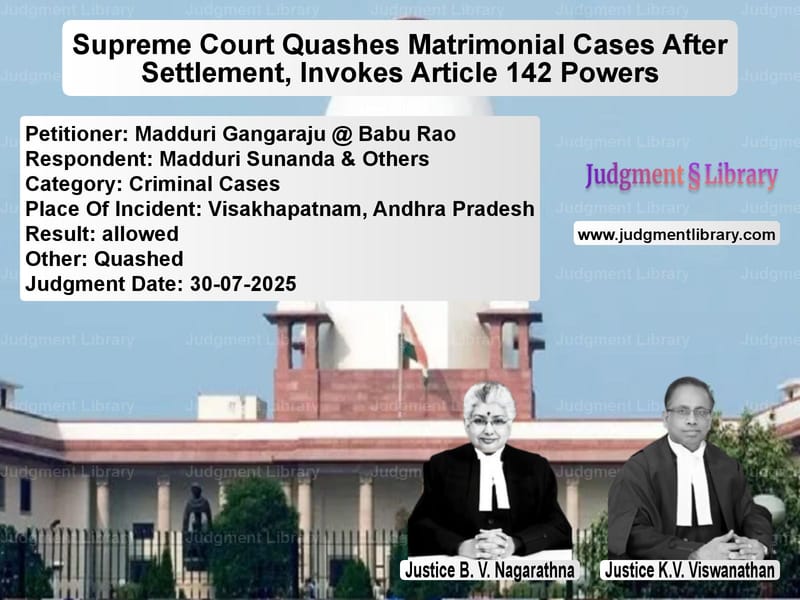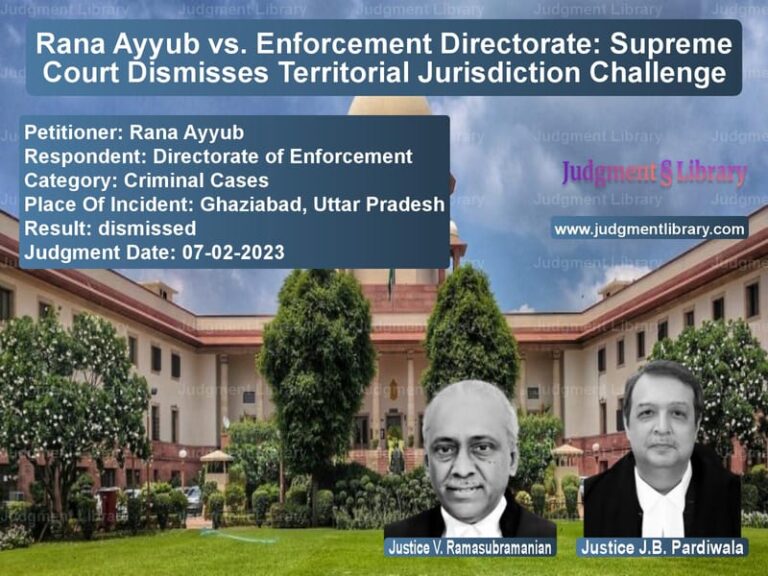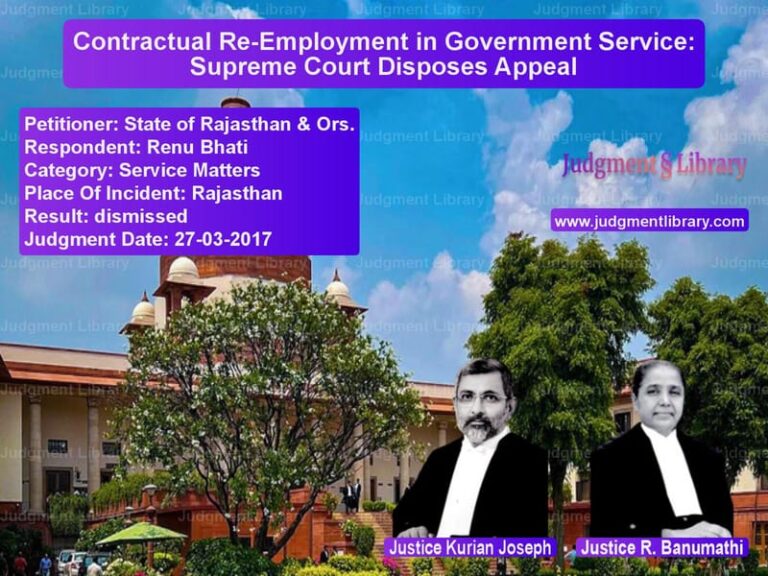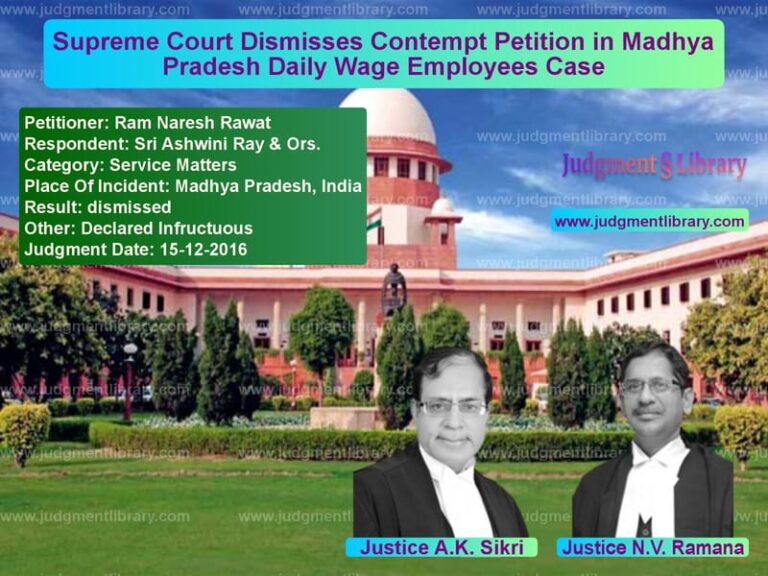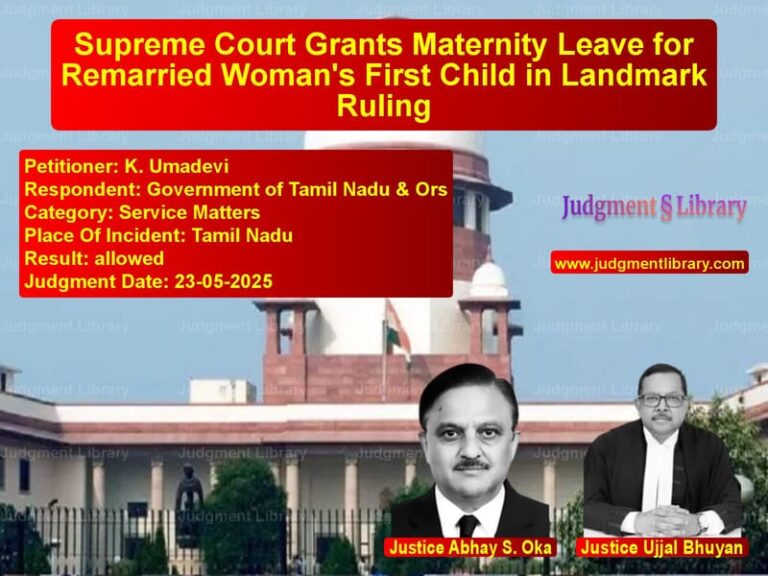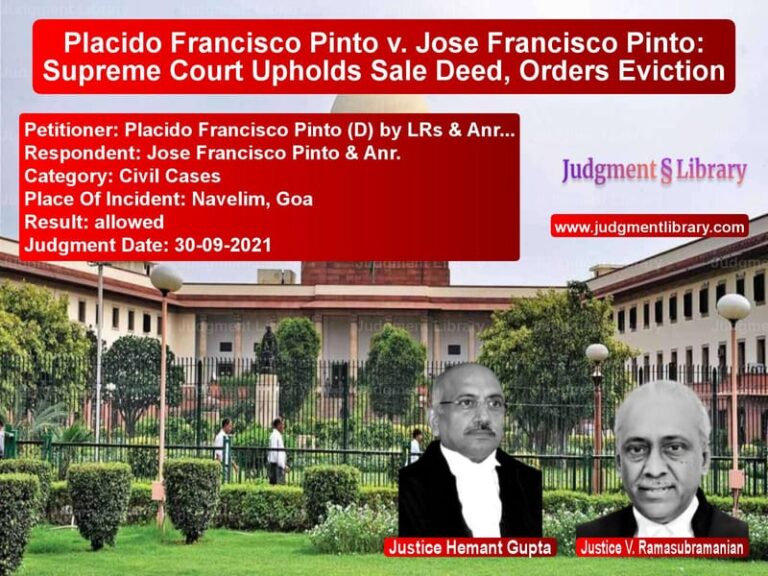Supreme Court Quashes Matrimonial Cases After Settlement, Invokes Article 142 Powers
In a landmark judgment that underscores the importance of amicable settlements in matrimonial disputes, the Supreme Court of India has quashed all criminal proceedings between estranged spouses who had reached a comprehensive settlement through Lok Adalat. The case involved Madduri Gangaraju @ Babu Rao, the brother-in-law of the complainant, who challenged multiple legal proceedings initiated against him and other family members by his sister-in-law, Madduri Sunanda, following the dissolution of her marriage.
The legal saga began with the marriage between Madduri Venkateswara Rao and Madduri Sunanda on May 1, 2001. The couple moved to the United States in October 2002, but their relationship soured within three years, leading to a mutual decision to seek divorce. The Superior Court of California granted their divorce on March 15, 2007, seemingly bringing an end to their marital relationship. However, what followed was a protracted legal battle spanning multiple jurisdictions and involving various legal remedies.
The Proliferation of Legal Proceedings
Upon returning to India, instead of moving on with their separate lives, the parties embarked on a legal journey that would consume the next several years. On November 5, 2008, the wife filed a matrimonial suit seeking restitution of conjugal rights, followed by a police complaint on November 20, 2008, which eventually became Complaint Case No. 991 of 2010. Simultaneously, she moved the California court to set aside the divorce judgment, but this application was dismissed on January 19, 2010.
The legal actions intensified with the filing of a case under the Protection of Women from Domestic Violence Act, 2005, on November 8, 2010, and an FIR No. 28 of 2011 on March 18, 2011, under Sections 494 and 498A of the Indian Penal Code against the husband’s family members, including the appellant. These multiple proceedings prompted the husband and his family members to approach the High Court of Andhra Pradesh seeking quashing of these cases under Section 482 of the Code of Criminal Procedure.
The High Court’s Decision and Subsequent Developments
The High Court, in its common order dated March 30, 2012, refused to quash the proceedings, observing that the parties had lived together before, during, and after the divorce proceedings, and that the wife had given birth to a child during the pendency of divorce proceedings. This decision led to the present appeals before the Supreme Court.
During the pendency of the Supreme Court proceedings, a significant development occurred. The parties were referred to Lok Adalat, where they reached a comprehensive settlement in Lok Adalat Case No. 436 of 2022. The settlement award, passed under Section 21 of the Legal Services Authority Act, 1987, on December 28, 2022, marked a turning point in the long-standing dispute.
The Settlement Terms
The Lok Adalat award contained several crucial terms that would ultimately form the basis for the Supreme Court’s decision. The wife admitted the validity of a gift settlement deed dated October 6, 2006, and agreed that the husband was the absolute owner of the property. More importantly, she agreed to withdraw all pending cases, including appeals before the High Court and Supreme Court, and cooperate in filing compromise memos. Both parties agreed not to make any future claims against each other regarding properties, and the wife acknowledged that there would be no chance for cohabitation and that she would take separate steps for dissolution of marriage.
Legal Arguments Before Supreme Court
Before the Supreme Court, Sri S. Wasim A. Qadri, learned senior counsel for the appellant, emphasized that the marriage had been dissolved by a decree of divorce on March 15, 2007, which had attained finality. All subsequent complaints, including those under the Domestic Violence Act, were filed after the dissolution of marriage. He urged the Court to exercise its jurisdiction under Article 142 of the Constitution to quash all proceedings, which had already been stayed by the Court since August 17, 2012.
Mr. K.P. Sundar Rao, learned counsel for respondent No. 1, initially defended the High Court’s decision but ultimately left it to the Court to pass appropriate orders in view of the settlement.
The Supreme Court’s Landmark Analysis
The Supreme Court, comprising Justices B.V. Nagarathna and K.V. Viswanathan, delivered a comprehensive judgment that balanced legal principles with the practical realities of settled matrimonial disputes. The Court extensively referred to its recent jurisprudence on the subject.
In Dara Lakshmi Narayana vs. State of Telangana, the Court had held that “family members of the husband ought not to be unnecessarily roped into criminal proceedings arising out of matrimonial discord. The Court observed that it has become a recurring tendency to implicate every member of the husband’s family, irrespective of their role or actual involvement, merely because a dispute has arisen between the spouses.” The Court further noted that “criminal law is not to be deployed as an instrument of harassment and that judicial scrutiny must be exercised to guard against such misuse.”
The Court also relied on Mala Kar vs. State Of Uttarakhand and Arun Jain vs. State of NCT of Delhi, where it had quashed criminal proceedings arising from matrimonial discord after the parties had divorced, holding that continuing criminal prosecution in such situations would amount to abuse of the process of law.
In Ramawatar vs. State of Madhya Pradesh, the Court had invoked Article 142 powers to quash criminal proceedings after a settlement, noting that “The Supreme Court in exercise of its jurisdiction under Article 142 has the power to make such order as is necessary for doing complete justice between the parties in any cause or matter pending before it.”
Application of Legal Principles
The Court identified several crucial factors in the present case: the divorce decree had attained finality; all criminal complaints were filed after the dissolution of marriage; the parties had reached a comprehensive settlement through Lok Adalat; the wife had agreed to withdraw all cases; and both parties had agreed not to make future claims against each other.
The Court emphasized that “the power under Article 142 must be invoked to advance the cause of complete justice in matters of this nature. Once the parties have genuinely settled all their differences amicably, the continuation of criminal proceedings between the parties serves no legitimate purpose. It only prolongs bitterness and burdens the criminal justice system with disputes that are no longer alive.”
Referring to Gian Singh vs. State of Punjab, the Court noted that “where the High Court quashes a criminal proceeding having regard to the fact that the dispute between the offender and the victim has been settled, although the offences are not compoundable, it does so as in its opinion, continuation of criminal proceedings will be an exercise in futility and justice in the case demands that the dispute between the parties is put to an end and peace is restored, securing the ends of justice being the ultimate guiding factor.”
The Court particularly highlighted that this principle applies to “offences arising out of matrimony, particularly relating to dowry, etc. or a family dispute, where the wrong is basically to the victim but the offender and the victim have settled all disputes between them amicably.”
The Final Ruling
In its conclusive reasoning, the Court held that “proceeding with the trial, when the parties have amicably resolved the dispute, would be futile and the ends of justice require that the settlement be given effect to by quashing the proceedings. It would be a grave abuse of process particularly when the dispute is settled and resolved.”
The Court allowed the appeals and quashed FIR No. 28 of 2011 and all consequent proceedings, setting aside the High Court’s order. The Court exercised its powers under Article 142 of the Constitution, noting that “the prosecution of the criminal case by respondent No.1 herein is not as per her intention any longer. Moreover, the continuation of the criminal proceeding would only be an instance of harassment to the appellants having regard to the peculiar facts of the case. Further, no fruitful purpose would be served in the continuation of the court proceedings and taking it to its logical end.”
This judgment reinforces the Supreme Court’s consistent approach of promoting settlements in matrimonial disputes, particularly when parties have moved on with their lives and reached amicable resolutions. It serves as a reminder that the criminal justice system should not be used as a tool for perpetuating disputes that have been genuinely resolved between parties, especially in matters arising from matrimonial discord where the primary stakeholders have found closure through mutual agreement.
Petitioner Name: Madduri Gangaraju @ Babu Rao.Respondent Name: Madduri Sunanda & Others.Judgment By: Justice B. V. Nagarathna, Justice K.V. Viswanathan.Place Of Incident: Visakhapatnam, Andhra Pradesh.Judgment Date: 30-07-2025.Result: allowed.
Don’t miss out on the full details! Download the complete judgment in PDF format below and gain valuable insights instantly!
Download Judgment: madduri-gangaraju-@-vs-madduri-sunanda-&-ot-supreme-court-of-india-judgment-dated-30-07-2025.pdf
Directly Download Judgment: Directly download this Judgment
See all petitions in Domestic Violence
See all petitions in Dowry Cases
See all petitions in Judgment by B.V. Nagarathna
See all petitions in Judgment by K.V. Viswanathan
See all petitions in allowed
See all petitions in Quashed
See all petitions in supreme court of India judgments July 2025
See all petitions in 2025 judgments
See all posts in Criminal Cases Category
See all allowed petitions in Criminal Cases Category
See all Dismissed petitions in Criminal Cases Category
See all partially allowed petitions in Criminal Cases Category

